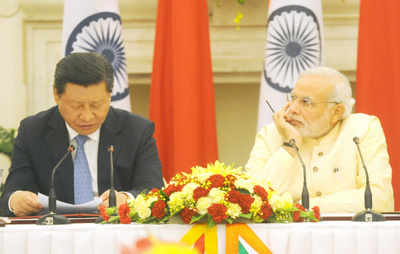- News
- India News
- China uses Pakistan to blunt India's NSG membership bid
Trending
This story is from September 26, 2016
China uses Pakistan to blunt India's NSG membership bid
Last week, China held another round of Arms Control Consultation with Pakistan in which it discussed Islamabad's application for NSG membership and also "indicated" placing Pakistan's views and inputs to the group for consideration.

Chinese President Xi Jinping and Prime Minister Narendra Modi. (TOI file photo)
Key Highlights
- China continued to prop up Islamabad as a counterpoise against India's bid for membership of NSG
- Last week, China held another round of Arms Control Consultation with Pak to discuss its bid
- The China-Pak dialogue comes within days of India's "candid and substantive" talks with Beijing on its NSG bid
NEW DELHI: As India mounts a diplomatic offensive against Pakistan over the issue of terrorism, China has again signalled it will continue to prop up Islamabad as a counterpoise against India's bid for membership of Nuclear Supplies Group.
Last week, China held another round of Arms Control Consultation with Pakistan in which it discussed Islamabad's application for NSG membership and also "indicated" on placing Pakistan's views and inputs to the group for consideration.The China-Pakistan dialogue comes within days of India's "candid and substantive" talks with Beijing here on its NSG bid.
According to Chinese authorities, Beijing shared with Pakistan its views on recent developments and also its principled position over the issue of participation of non-NPT countries in the NSG.
What's amusing though is that the language used in the statement by the Chinese embassy in Pakistan is almost identical to the one issued by China's mission in Delhi after the Sino-Indian NSG talks. Like in the case with the statement on India, the Chinese communication on Pakistan too says it will bring the view of Islamabad to the NSG. China's assurance is still important though in the light of Beijing's use of Pakistan to blunt India's campaign for membership.
In the case of its statement with India though, Beijing spoke in detail about the need for a two-step process to explore a "non-discriminatory formula'' which it said would be applicable to all non-NPT states seeking to join NSG.
China wants NSG to consider country-specific waiver only after this formula is arrived at. This approach, of course, failed to provide any breakthrough in talks even though the two officials agreed to again meet soon over the issue.
China, in fact, has maintained all along that the NSG consider a criteria based approach for non-NPT countries before getting into any country-specific issue. While China itself is accused of violating both NSG and a 2010 NPT consensus on not transferring nuclear material to countries (like Pakistan) which have not brought their facilities under IAEA safeguards, that has not come in the way of Beijing highlighting the need for non-NPT states to address the "gap'' between their existing practices and existing global non-proliferation rules "based on NPT as the cornerstone''.
India believes in doing that, and in clubbing India with Pakistan, China continues to show complete disregard for India's internationally acknowledged non-proliferation credentials.
Last week, China held another round of Arms Control Consultation with Pakistan in which it discussed Islamabad's application for NSG membership and also "indicated" on placing Pakistan's views and inputs to the group for consideration.The China-Pakistan dialogue comes within days of India's "candid and substantive" talks with Beijing here on its NSG bid.
According to Chinese authorities, Beijing shared with Pakistan its views on recent developments and also its principled position over the issue of participation of non-NPT countries in the NSG.
What's amusing though is that the language used in the statement by the Chinese embassy in Pakistan is almost identical to the one issued by China's mission in Delhi after the Sino-Indian NSG talks. Like in the case with the statement on India, the Chinese communication on Pakistan too says it will bring the view of Islamabad to the NSG. China's assurance is still important though in the light of Beijing's use of Pakistan to blunt India's campaign for membership.
After China, with the backing of a few other countries, blocked India's bid for membership at the Seoul NSG plenary in June, Chinese foreign minister Wang Yi proposed a dialogue between the director generals of disarmament of the two countries when he met his counterpart Sushma Swaraj here last month. While discussing NSG, Swaraj had spoken about the importance of India meeting its clean energy goals in context of the Paris climate agreement. A Chinese delegation led by director general Wang Qun of the foreign ministry visited India on September 13 for talks with an Indian contingent led by MEA's Amandeep Singh Gill, joint secretary (disarmament and international security).
In the case of its statement with India though, Beijing spoke in detail about the need for a two-step process to explore a "non-discriminatory formula'' which it said would be applicable to all non-NPT states seeking to join NSG.
China wants NSG to consider country-specific waiver only after this formula is arrived at. This approach, of course, failed to provide any breakthrough in talks even though the two officials agreed to again meet soon over the issue.
China, in fact, has maintained all along that the NSG consider a criteria based approach for non-NPT countries before getting into any country-specific issue. While China itself is accused of violating both NSG and a 2010 NPT consensus on not transferring nuclear material to countries (like Pakistan) which have not brought their facilities under IAEA safeguards, that has not come in the way of Beijing highlighting the need for non-NPT states to address the "gap'' between their existing practices and existing global non-proliferation rules "based on NPT as the cornerstone''.
India believes in doing that, and in clubbing India with Pakistan, China continues to show complete disregard for India's internationally acknowledged non-proliferation credentials.
End of Article
FOLLOW US ON SOCIAL MEDIA










